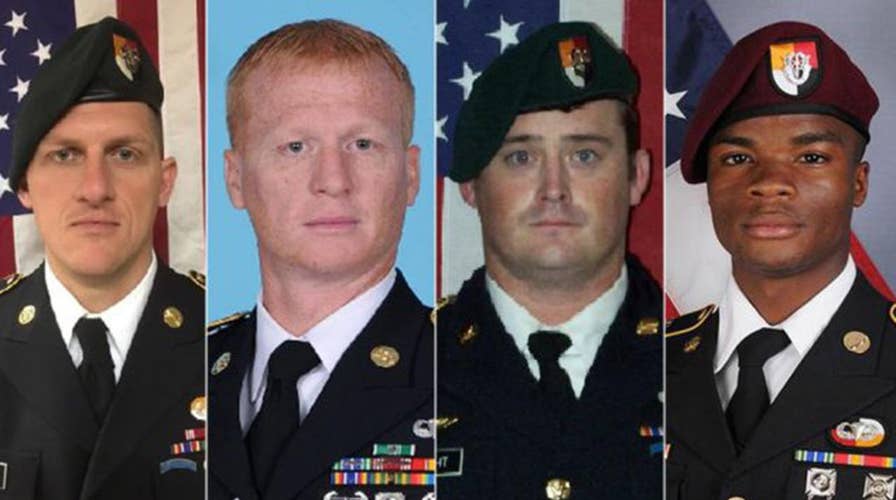Four U.S. Special Forces soldiers were killed in Niger earlier this month, and the media are demanding answers. This is to be expected after America suffers combat losses in a country that is not considered a declared warzone. But rather than searching for the facts of this incident, many questions from the press, and some recent statements from members of Congress, have been blatant attempts to form a narrative of incompetence, conspiracy and cover up within the Trump administration.
Perhaps this mentality was most clearly expressed by Congresswoman Frederica Wilson, D-Florida, who after recently thrusting herself into the national spotlight through the politicization of a Gold Star widow, also decided to openly declare that the ambush in Niger is “Trump’s Benghazi.”
This is irresponsible nonsense.
Yes, four brave Americans died in Benghazi in 2012 -- the same number who were killed outside the village of Tongo Tongo in Niger. Both incidents occurred on the African continent, and involved Islamic extremists. But the relevant similarities end there.
The Obama administration’s response to the terrorist attack in Benghazi on September 11, 2012, was an out and out debacle before, during and after the assault. As we know from thorough Congressional hearings, there were calls for additional security from U.S. Ambassador Chris Stevens that went ignored for weeks. During the actual attack, two U.S. compounds came under sustained assault, reinforcements were delayed or denied, and it took 13 hours before an evacuation was completed. All of this occurred at the height of President Obama’s reelection efforts, and media circled the wagons to protect the Democrats’ electoral prospects.
For politicians and the media to suggest, without any evidence, that the Niger ambush is the result of White House incompetence or a Pentagon cover up is partisanship masquerading as concern for our armed forces.
The Niger ambush on October 4 was an entirely different situation. Elite U.S. Special Forces were engaged in a reconnaissance meeting in a conflict zone that is home to Islamic State and al Qaeda affiliates, as well as Boko Haram. There are approximately 800 U.S. service members in Niger allied to indigenous forces, and an additional 4,000 French troops in support. The 12-man Special Forces team that went into Tongo Tongo was a seasoned group of American warriors, operating within the mission parameters of regional counterterrorism in a very dangerous part of the globe.
It went bad. Though the specific tactical circumstances are still under investigation, the Pentagon has made clear that a large force of likely Islamic State of the Greater Sahara (ISGS) terrorists engaged U.S. and Nigerien personnel in a complex ambush with vehicle mounted weapons and Rocket Propelled Grenades (RPGs). Once the after action review is complete, there will be lessons learned from this incident for the U.S. military, but from what we know so far their was nothing unusual about this particular S.F. mission, and the response to the unfolding crisis was rapid.
To that end, Chairman of the Joint Chiefs General Dunford gave a clarified timeline earlier this week. A U.S. unmanned aerial vehicle was redeployed almost immediately to provide assistance to our embattled Spec Ops troops. French combat air support was called, and Mirage fighter jets responded within 30 minutes. Wounded American commandos were airlifted to safety. And the brothers in arms of Sgt. La David Johnson, who was killed in action, returned to the battlefield to retrieve his body, as Johnson had been separated from them during the fighting. Nobody was left behind.
The loss of U.S. soldiers anywhere is a tragedy for all Americans, and honor demands the families of the fallen receive the full sympathy and support of the American people. But for politicians and the media to suggest, without any evidence, that the Niger ambush is the result of White House incompetence or a Pentagon cover up is partisanship masquerading as concern for our armed forces. It does our men and women in uniform, and the American people they protect, a disservice when the media uses military casualties as partisan weapons.
The war on radical Islamic terrorism knows no boundaries, and all U.S. military personnel are targets. This is especially true in the declared warzones of Iraq and Afghanistan, where the U.S. maintains large troops deployments, but our men and women in uniform are also under threat from Jihadist terrorism wherever they operate around the world. As our training and support missions to combat terrorism in sub-Saharan Africa expand, so will the risks our military undertake.

